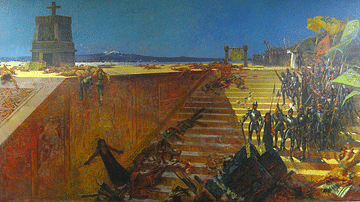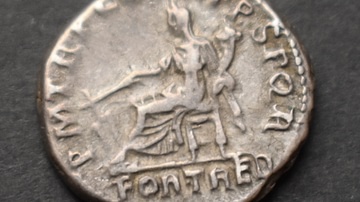Search
Search Results

Article
The Delian League, Part 6: The Decelean War and the Fall of Athens (413/2-404/3 BCE)
This text is part of an article series on the Delian League. The sixth and last phase of the Delian League begins with the Decelean War, also referred to as the Ionian War, and ends with the surrender of Athens (413/2 – 404/3 BCE). The final...

Article
1453: The Fall of Constantinople
The city of Constantinople (modern Istanbul) was founded by Roman emperor Constantine I in 324 CE and it acted as the capital of the Eastern Roman Empire, or Byzantine Empire as it has later become known, for well over 1,000 years. Although...

Definition
Orosius
Paulus Orosius (usually given as Orosius, 5th century CE) was a Christian theologian and historian who was also a friend and protege of St. Augustine of Hippo (l. 354-430 CE). He is best known for his work Seven Books of History Against the...

Article
Pizarro & the Fall of the Inca Empire
In 1533 CE the Inca Empire was the largest in the world. It extended across western South America from Quito in the north to Santiago in the south. However, the lack of integration of conquered peoples into that empire, combined with a civil...

Article
The Fall of Tenochtitlan
The fall of Tenochtitlan on 13 August 1521 was a decisive moment in the dramatic collapse of the Aztec empire which had dominated Mesoamerica. Led by Hernán Cortés (1485-1547), the Spanish conquistadors enjoyed superior weapons and tactics...

Article
Polybius' Capture of Achaeus and Fall of Sardis
Polybius' Capture of Achaeus and Fall of Sardis is the account of the end of the Siege of Sardis (215-213 BCE) by Antiochus III (aka Antiochus the Great, r. 223-187 BCE) of the Seleucid Empire after the betrayal and capture of his cousin...

Article
Authority in Ancient Rome: Auctoritas, Potestas, Imperium, and the Paterfamilias
Authority in ancient Rome was complex, and as one can expect from Rome, full of tradition, myth, and awareness of their own storied history. Perhaps the ultimate authority was imperium, the power to command the Roman army. Potestas was legal...

Article
Caesar As Dictator: His Impact on the City of Rome
Gaius Julius Caesar (100-44 BCE) first assumed the role of dictator in 49 BCE, however, once he had secured his election as consul for the following year, he resigned after 11 days. After defeating Pompey at the Battle of Pharsalus in 48...

Article
Fall of the East India Company
The British East India Company (1600-1874) was the largest and most successful private enterprise ever created. All-powerful wherever it colonised, the EIC's use of its own private army and increasing territorial control, particularly in...

Article
Capitals of the Roman Empire: Constantinople & Rome
Constantinople at first had much in common with the temporary capitals of the 2nd and 3rd century CE and the tetrarchic capitals. It was an existing city of medium size, well located on the road network, and unlike most of them, it was also...